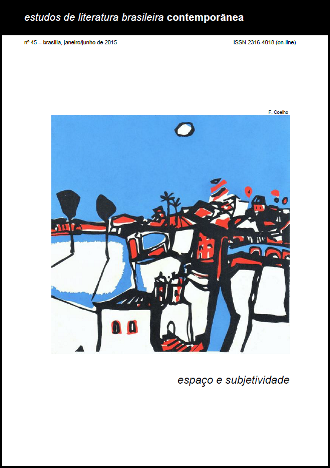O que é literatura? ”“
Provocações metalinguísticas em narrativas de Luci Collin
DOI:
https://doi.org/10.1590/2316-40184517Abstract
Não são poucas as iniciativas empreendidas no âmbito da teoria e da crítica literárias no sentido de delimitar o que vem a ser literatura. Cada novo contexto histórico-literário traz consigo novas expectativas em relação ao texto literário e, portanto, novos critérios de valoração. Produzida no contexto da chamada pós-modernidade, marcado pela desconfiança em relação aos discursos universais, a literatura brasileira contemporânea, não raro, tem se debruçado sobre si própria, com vistas à problematização das fronteiras, cruzamentos e interseções que estabelece com outras linguagens. Em vista disso, nosso objetivo no presente artigo é refletir acerca de um conjunto de contos de Luci Collin, cujo caráter metaficcional nos convida para esse debate. A perspectiva teórica interdisciplinar é alicerçada no pensamento pós-estruturalista.
Downloads
References
BAUMAN, Zygmunt (2005). Identidade. Tradução de Carlos Alberto Medeiros. Rio de Janeiro: Jorge Zahar.
BORDADURA (1986). In: Novo Aurélio da Língua Portuguesa. 2. ed. Rio de Janeiro: Nova Fronteira.
BORDEJAMENTO (1986). In: Novo Aurélio da Língua Portuguesa. 2. ed. Rio de Janeiro: Nova Fronteira.
BOURDIEU, Pierre (2008). A economia das trocas linguísticas: o que falar que dizer. Tradução de Sérgio Miceli et al. 2. ed. São Paulo: Ed. USP.
CHARTIER, Roger (1990). A história cultural. Rio de Janeiro: Bertrand.
CHARTIER, Roger (1991). O mundo como representação. In: CHARTIER, Roger. Estudos avançados, v. 5, n.11, jan./abr.
COLLIN, Luci (1997). Lição invisível. Curitiba: Secretaria de Estado e de Cultura do Paraná.
COLLIN, Luci (2001). Precioso impreciso. São Paulo: Ciência do Acidente.
COLLIN, Luci (2004). Inescritos. Curitiba: Travessa dos Escritores.
COLLIN, Luci (2008a). Acasos pensados. Curitiba: Kafka.
COLLIN, Luci (2008b). Vozes num divertimento. Curitiba: Travessa dos Escritores.
COLLIN, Luci (2011).Com que se pode jogar. Curitiba: Kafka.
DIÁLOGO (1986). In: Novo Aurélio da Língua Portuguesa. 2. ed. Rio de Janeiro: Nova Fronteira.
ENROLO (1986). In: Novo Aurélio da Língua Portuguesa. 2. ed. Rio de Janeiro: Nova Fronteira.
FERNANDES, Gisele M. (2009). O pós-modernismo. In: BONNICI, Thomas,; ZOLIN, Lúcia Osana (Orgs.) Teoria literária: abordagens históricas e tendências contemporâneas. 3. ed. Maringá: Eduem.
FOUCAULT. Michel (2001). A ordem do discurso. Tradução de Laura Fraga de Almeida Sampaio. 7. ed. São Paulo: Loyola.
GINZBURG, Carlo (2001). Olhos de madeira: nove reflexões sobre a distância. São Paulo: Companhia das Letras.
HUTCHEON, Linda (1991). Poética do pós-modernismo. Rio de Janeiro: Imago.
LYOTARD, Jean-François (2000). A condição pós-moderna. Tradução de Ricardo C. Barbosa. 6. ed. Rio de Janeiro: José Olympio.
TEIXEIRA, Níncia Cecília Ribas Borges (2008). Escrita de mulheres e a (des)construção do cânone literário na pós-modernidade: cenas paranaenses. Guarapuava: Ed. Unicentro.
Downloads
Published
How to Cite
Issue
Section
License
Authors who publish in this journal agree to the following terms:
a) The authors maintain the copyright and grant the journal the right of first publication, the work being simultaneously licensed under the Creative Commons Attribution License-Non Commercial 4.0 which allows the sharing of the work with acknowledgment of the authorship of the work and publication this journal.
b) Authors are authorized to enter into additional contracts separately, for non-exclusive distribution of the version of the work published in this journal (eg publish in institutional repository or as a book chapter), with authorship recognition and publication in this journal.
c) Authors are allowed and encouraged to publish and distribute their work online (eg in institutional repositories or on their personal page) after the editorial process, as this can generate productive changes, as well as increase the impact and citation of published work (See The Effect of Free Access).
d) The authors of the approved works authorize the magazine to, after publication, transfer its content for reproduction in content crawlers, virtual libraries and the like.
e) The authors assume that the texts submitted to the publication are of their original creation, being fully responsible for their content in the event of possible opposition by third parties.


